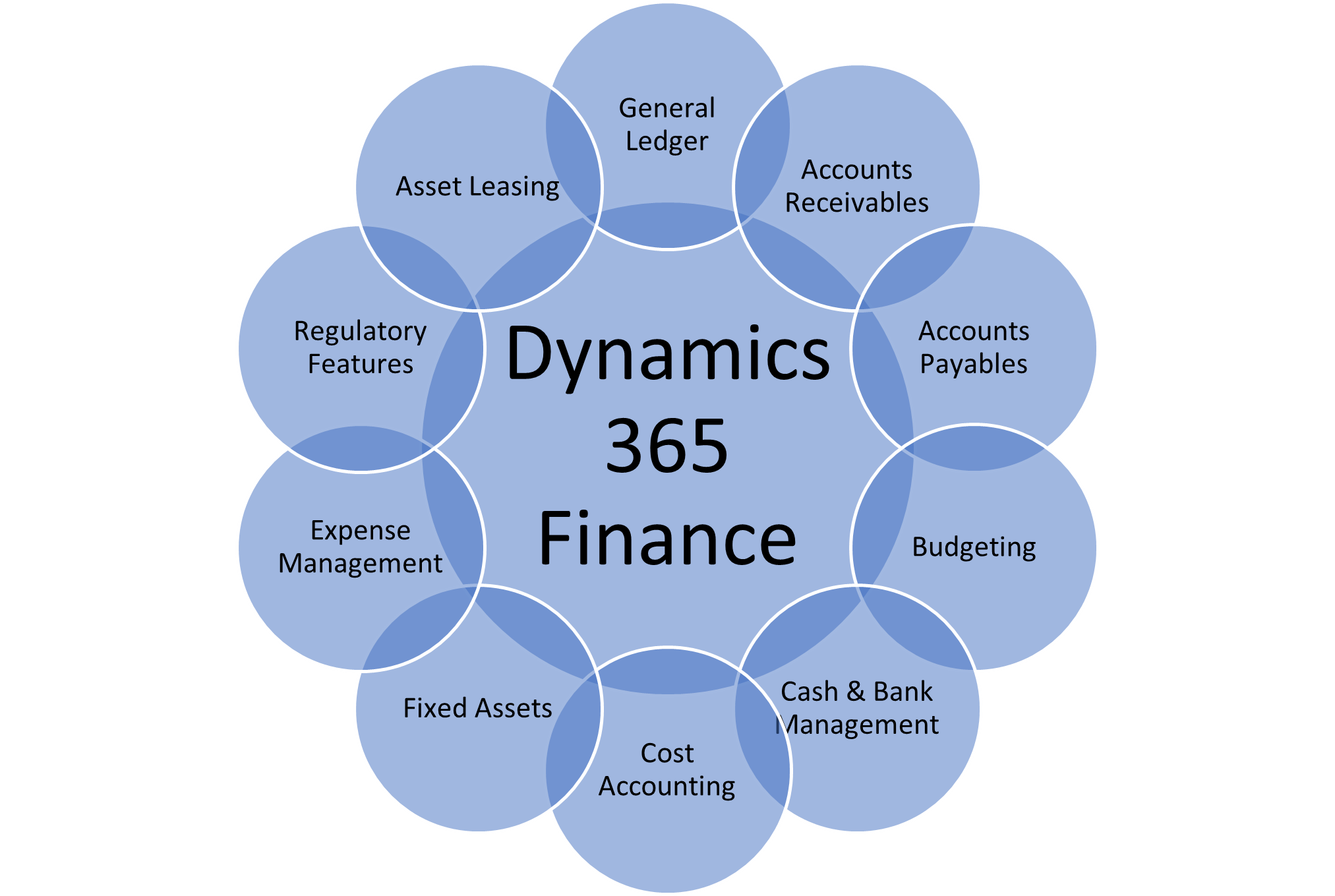Dynamics 365 Finance and Operations
As one of the industry’s top ERP systems, it is used by organizations in a variety of industries and geographies across the world. The product is broad and scalable enough for some of the world’s largest organizations, but it is at the same time flexible enough to meet the needs of higher growth mid-size organizations.
Explore Finance capabilities and features
Microsoft Dynamics 365 Finance can cater to the multi-company, multi-currency business of an organization and monitor the performance of a company on a real-time basis. Dynamics 365 Finance is capable of forecasting future results and making data-driven decisions to boost the growth of the organization, regardless of its size and the industry in which it operates. The following illustration and topics highlight some of the capabilities of Dynamics 365 Finance.

General ledger
The general ledger module is used to define and manage a legal entity’s financial records. The general ledger is a register of debit and credit entries. These entries are classified using the accounts that are listed in a chart of accounts.
Accounts receivables
Accounts receivable is used to track customer invoices and incoming payments. You can create customer invoices that are based on sales orders or packing slips. You can create free text invoices if the invoices are not related to sales orders. You can also receive payments by using several payment types, which include bills of exchange, cash, checks, credit cards, and electronic payments.
Accounts payables
You can manually enter vendor invoices or import them electronically through integration services. After invoices are entered or received, they can be reviewed and approved by using an invoice approval journal. The system can enable the use of invoice matching, vendor invoice policies, and workflows to automate the review process so that invoices that meet certain criteria are automatically approved and the remaining invoices are flagged for review.
Budgeting
This module provides an overview of the budgeting functionality components, budgeting tools, and reporting capabilities. The budget module in Dynamics 365 is divided into three primary sections: budget planning, budget entry, and budget control. Budget planning is the process that ensures the organization policies, procedures, and requirements are met while implementing the budget. Budget entry, the following step, helps register the budget line items in Dynamics 365 Finance and maps the line items with general ledger accounts. Budget control is the optional step that validates the financial transactions in Dynamics 365 Finance based on the registered budget lines.
Cash and bank management
Cash and bank management is used to maintain the legal entity’s bank accounts and the financial instruments that are associated with those bank accounts. These instruments include deposit slips, checks, bills of exchange, and promissory notes. You can also reconcile bank statements and print bank data on standard reports.
Cost accounting
This module manages the processes used in cost accounting, such as allocation base, cost accounting ledger, cost entry, cost classification, and cost behavior.
Fixed assets
This module provides access to resources that use fixed assets for Dynamics 365 Finance. Fixed assets are items of value which are owned by an individual or organization. The items include buildings, vehicles, land, and equipment.
Expense management
Expense management can create an integrated workflow to store payment method information, import credit card transactions, and track the money that employees spend. You can also define expense policies and automate the reimbursement of travel expenses.
Regulatory features
Finance and operations apps include functionality for different countries/regions. This functionality is enabled based on the primary address of the active legal entity. Regulatory updates are features that are implemented to support new or changed country-specific or region-specific legislation. This topic helps to get country/region specific update. It also submits and reviews regulatory alerts. You can check Regulatory updates link for the latest regulatory update plans.
Asset leasing
Dynamics 365 Finance provides an advanced capability for managing, tracking, and automating financial transactions for leased assets. This module can capture and process the lease details and generate journal entries throughout the lifecycle of the lease, from initial recognition, to monthly journal entries, to impairment and termination of the lease.
We are happy to help!
Our advisors are here to help you chart a course to success. They can answer all your Salesforce-related questions, including topics like:
- Our entire product portfolio
- Pricing information
- Implementation and adoption planning
If you need technical support for your projects simply reach us at contact@bizsoft.com.sg or fill out the form below and we’ll be in touch shortly.
User Reviews
Be the first to review “Dynamics 365 Finance and Operations”
You must be logged in to post a review.







There are no reviews yet.